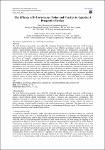| dc.description.abstract | The Arab Spring foregrounded a new reality that a digitally disruptive and highly networked world presents a
wicked governance problem for governments seeking to enact effective governance systems in an era where
citizen’s unconventional digital mobilization can unseat repressive and unresponsive governments. This
reinforces the need for spontaneous, contextually grounded and participatory e-governance mechanisms given
their normative and transformative capacity to shift beliefs and norms of policy makers, enhance quality of
policy outputs, elicit public confidence and heighten government’s legitimacy. In this paper, the authors assess
the efficacy of Uganda’s e-governance policy, praxis and challenges as part of the broader e-governance
discourse in the global south. The outcomes reveal that Uganda has instituted excellent legal, institutional and
infrastructural e-governance mechanisms, but the conspicuous absence of political will, by an increasingly
vulnerable political elite class, hampers sustainability of effective e-governance. Measures like rash and selective
application of laws, introduction of new repressive laws, coercive means including violence and arbitrary arrest
for dissenting opinions, increased state sponsored online and offline surveillance, internet shutdowns, network
disruptions, online harassment, remote intrusion of civil society websites, and censorship, only further shrink
civic space ultimately knocking both trust and legitimacy. Therefore, we propose that government prioritizes
expansion of civic space to allow favourably reflexive and participatory citizen engagement as a pathway to
enhanced quality of policy outputs and governance as a means to achieve its Vision 2040 by way of digital
infrastructure, connectivity, legal and institutional frameworks and media freedom are dependent on political
will. | en_US |

